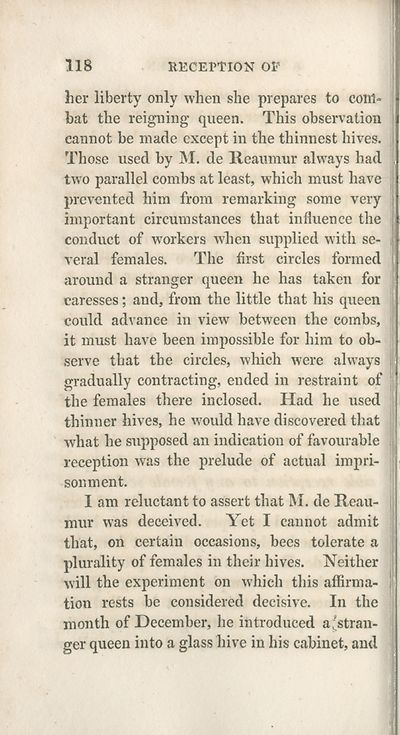Download files
Complete book:
Individual page:
Thumbnail gallery: Grid view | List view

118
RECEPTION OP
her liberty only when she prepares to com¬
bat the reigning* queen. This observation
cannot be made except in the thinnest hives.
Those used by M. de Reaumur always had
two parallel combs at least, which must have
prevented him from remarking some very
important circumstances that influence the
conduct of workers when supplied with se¬
veral females. The first circles formed
around a stranger queen he has taken for
caresses; and, from the little that his queen
could advance in view between the combs,
it must have been impossible for him to ob¬
serve that the circles, which were always
gradually contracting, ended in restraint of
the females there inclosed. Had he used
thinner hives, he would have discovered that
what he supposed an indication of favourable
reception was the prelude of actual impri¬
sonment.
I am reluctant to assert that M. de Reau¬
mur was deceived. Yet I cannot admit
that, on certain occasions, bees tolerate a
plurality of females in their hives. Neither
will the experiment on which this affirma¬
tion rests be considered decisive. In the
month of December, he introduced a'stran¬
ger queen into a glass hive in his cabinet, and
RECEPTION OP
her liberty only when she prepares to com¬
bat the reigning* queen. This observation
cannot be made except in the thinnest hives.
Those used by M. de Reaumur always had
two parallel combs at least, which must have
prevented him from remarking some very
important circumstances that influence the
conduct of workers when supplied with se¬
veral females. The first circles formed
around a stranger queen he has taken for
caresses; and, from the little that his queen
could advance in view between the combs,
it must have been impossible for him to ob¬
serve that the circles, which were always
gradually contracting, ended in restraint of
the females there inclosed. Had he used
thinner hives, he would have discovered that
what he supposed an indication of favourable
reception was the prelude of actual impri¬
sonment.
I am reluctant to assert that M. de Reau¬
mur was deceived. Yet I cannot admit
that, on certain occasions, bees tolerate a
plurality of females in their hives. Neither
will the experiment on which this affirma¬
tion rests be considered decisive. In the
month of December, he introduced a'stran¬
ger queen into a glass hive in his cabinet, and
Set display mode to:
![]() Universal Viewer |
Universal Viewer | ![]() Mirador |
Large image | Transcription
Mirador |
Large image | Transcription
| Antiquarian books of Scotland > Curiosities & wonders > New observations on the natural history of bees > (136) |
|---|
| Permanent URL | https://digital.nls.uk/128807499 |
|---|
| Description | Thousands of printed books from the Antiquarian Books of Scotland collection which dates from 1641 to the 1980s. The collection consists of 14,800 books which were published in Scotland or have a Scottish connection, e.g. through the author, printer or owner. Subjects covered include sport, education, diseases, adventure, occupations, Jacobites, politics and religion. Among the 29 languages represented are English, Gaelic, Italian, French, Russian and Swedish. |
|---|

